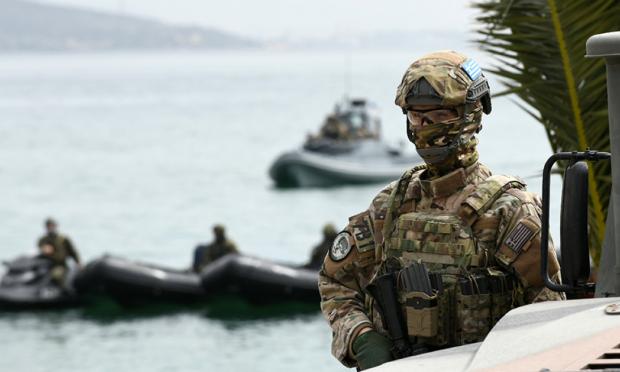Disclosure by journalist Uzey Bulut citing Turkish experts and advisers to Erdogan
On Turkey's pro-government AHaber TV channel, political analysts and national security experts enthusiastically discussed on February 28 how the Turkish Air Force could strike Greek islands in the Aegean Sea.
Speaking in front of a map of Turkey and Greece, Mesut Haki Kashin, professor of international law and advisor to Turkish President Recep Tayyip Erdogan on security and foreign policy issues, spoke about the Turkish Kaan fighter jet, which is currently under development, saying:
"This [Kaan] aircraft will not be detected by Greek radars. As aircraft of this type will strike the main targets [Aegean islands], swarms of escort UCAVs, ([ Bayraktar Akıncı), will destroy all Greek radars here [on the islands], leaving the Greeks blind.
Add to this our other drones of our combat drones, and you will conclude that the Greek squares will be destroyed in less than 3 hours. If the Greeks go to war with us, all the weapons on all those islands will be spoils of war for us."
Another Turkish analyst said: "The Turkish nation has a dream for these islands, but the official policy cannot be expressed publicly."
Another one blurted out that: "We will not invade the islands. We will use our right to move freely on them. We will use our right to use our freedom of movement. And then the islands will demographically pass to the Turkish people in a generation. In one generation, all the islands will be majority Turkish.
We are talking about conquest without war," while adding, "It happens like this [through demographic sovereignty]."
Another analyst disagreed: "These islands were under Ottoman rule for 500 years, but they were 95 percent demographically Greek. Even the Ottoman Empire could not Turkify them. Also, I don't believe Turkey will ever become a member of the EU. [The conquest of the islands] will only happen through war," they all concluded.
Osei Bulut said that in this way, the Turkish government aims to conquer the Greek islands in the Aegean, either militarily or demographically.
The goal remains the same and it is the occupation of the Greek islands.
Such discussions are common in Turkey's pro-government media
On February 6, Turkish analysts proudly discussed Turkey's prospects of striking Greece with missiles
On CNN Turk, pro-government analysts said that the Tayfun missile, the first Turkish-made short-range ballistic missile, could easily strike Greece from Turkey.
"If we launch it from Adrianople or Izmir, we can hit Athens," the same Turkish analysts concluded.
These threats are not new.
For at least the past five years, the Turkish government has threatened to invade and annex the Greek islands in the Aegean.
On the official X (Twitter) account of Turkey's ruling Justice and Development Party (AKP), a video was published on 22 April 2023, claiming that certain Greek islands and the Western Thrace region of Greece are part of Turkish territory.
The Turkish media also falsely and repeatedly claim that "152 Greek islands and islets in the Aegean belong to Turkey".
These islands, however, historically and legally belong to Greece, mainly through the 1924 Treaty of Lausanne, the 1932 Turkish-Italian Agreements and the 1947 Treaty of Paris.
Erdogan's Islamist government obviously aims to annex Greek territory for two main reasons:
The first, stems from a belief in neo-Ottomanism and the Islamic concept of conquest, or "fatih", from the Arabic word "fath".
The second reason, stems from the Turkish government's arrogant denial of past crimes against Christians.
As author Dr. Mark Durie explains, "The Islamic ideology of conquest demands that a land once conquered for Islam belong forever to Muslims. After the conquest, the previous occupants became tolerated clients of the Muslim conquerors and, under Islamic law, were allowed to survive as long as they paid tribute."
The foreign policy of the Islamist government of Turkey, in fact, is mainly shaped by the denial of any genocide that has been committed, as well as by its ideology of violent conquest and Ottoman-style territorial expansion, an approach that has created wars and enormous instability in the region, which we have seen in Cyprus, Syria, Iraq and Armenia.




